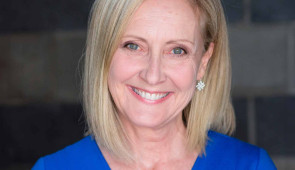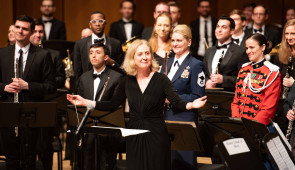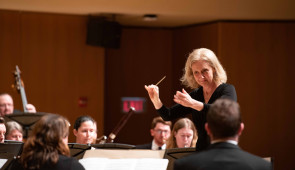Northwestern’s first woman director of bands to retire
Bienen School of Music celebrating Mallory Thompson with series of special concerts
- Link to: Northwestern Now Story
Mallory Thompson, director of bands and John W. Beattie Chair of Music at Northwestern University’s Henry and Leigh Bienen School of Music, will retire at the end of the 2023-24 academic year following a 28-year teaching and conducting career at Northwestern.
In 1996, Thompson made history as the first woman to be named to this prestigious position and only the third person to hold the title of director of bands at Northwestern. Her musical roots trace back to Northwestern where she earned an undergraduate degree in 1979 in trumpet performance under the tutelage of the renowned Vincent Cichowicz, a distinguished member of the Chicago Symphony Orchestra. She then earned a Master of Music degree in conducting as a student of John P. Paynter, the school’s second director of bands.
Throughout her tenure, Thompson directed the Symphonic Wind Ensemble, Northwestern’s most selective wind ensemble. The ensemble has participated in dozens of commissioning consortia, presented numerous world premieres and recorded five albums.
“The greatest honor of my professional life has been conducting the Symphonic Wind Ensemble. I’m proud of the music we have made together and our commitment to honoring the talents of our students every day,” Thompson said.
Maintaining an active schedule as a guest conductor, conducting teacher and guest lecturer throughout the United States and Canada, Thompson has taught conducting to thousands of undergraduates, graduate students and professional educators. former students hold important positions in universities, public schools, military bands and arts organizations across the country. Following her retirement from Northwestern, Thompson will continue as artistic director of the Northshore Concert Band, a position she’s held since 2003.
A season of celebration
In the upcoming 2023-24 season, Northwestern’s Symphonic Wind Ensemble will embark on a celebratory musical journey, featuring a selection of compositions from their recorded legacy alongside a mix of renowned classical pieces and contemporary works.
“We will even perform the work that was the subject of my doctoral thesis in 1985, ‘Karel Husa’s Concerto for Wind Ensemble,’” Thompson said.
Tickets can be reserved online at concertsatbienen.org, by phone at 847-467-4000, or in-person at the Ticket Office, which is located at the southeast entrance of Pick-Staiger Concert Hall. Ticket Office hours are Mondays through Fridays from 10 a.m.-6 p.m. and Saturdays from noon-3 p.m.
The Symphonic Wind Ensemble’s fall concert schedule is as follows:
The Symphonic Wind Ensemble opens the academic year with Kevin Day’s spirited “Dancing Fire,” which evokes the image of friends dancing and celebrating around a roaring bonfire. The work is followed by Eric Whitacre’s “Lux Aurumque,” originally written for a cappella choir; its shimmering, fluid harmonies depict a radiant and angelic visitation. Launy Grøndahl’s dramatic Concerto for Trombone features 2023 Northwestern Concerto Competition winner Dustin Nguyen as soloist. Concluding the program is Ottorino Respighi’s monumental tone poem, “Pines of Rome,” in the year of its 100th anniversary.
The ensemble’s second concert of the fall quarter is centered around themes of loss, grief and spirituality. Carlos Simon’s “Go Down Moses,” inspired by the spiritual of the same name, depicts the Biblical story of Moses and the 10 plagues from the perspective of the despairing Pharaoh. “Dream Elegy,” composed by new Bienen School Dean Jonathan Bailey Holland, is a somber response to the Black Lives Matter movement, dedicated to those who felt powerless against the system that allowed racist acts of violence to occur. Commissioned by the Los Angeles Philharmonic and Esa-Pekka Salonen and transcribed from the original works by Henry Purcell, Steven Stucky’s “Funeral Music for Queen Mary” is a haunting mix of Baroque and contemporary sounds. The concert closes with Olivier Messiaen’s massive commemoration of the dead of both world wars, “Et exspecto resurrectionem mortuorum.”
Multimedia Downloads
Photos of Mallory Thompson


